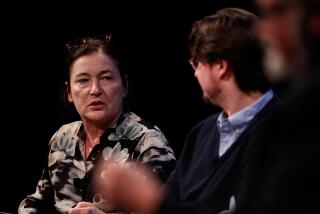Josephine Jacobsen, 94; Was Equivalent to U.S. Poet Laureate
- Share via
Josephine Jacobsen, a critically praised lyric poet and short-story writer who was once poetry consultant to the Library of Congress, has died. She was 94.
Jacobsen died late Wednesday of kidney failure at a retirement community in Cockeysville, Md.
For more than eight decades, her poems appeared regularly in the New Yorker and other leading publications.
But major recognition came to Jacobsen relatively late in life. It was not until 1971, when she was 63, that she became consultant in poetry to the Library of Congress, a position now called U.S. poet laureate. At age 88, she became a National Book Award finalist for “In the Crevice of Time.”
Critics said her poetry dealt with the anxieties of humankind, but beneath was a profound sense of optimism, based on her deeply held Roman Catholic beliefs, which included, as she once said, “belief in another chapter.”
Jacobsen described herself as a “short-range pessimist and a long-range optimist.” She thought the imagination was “the active, secret subterranean life.”
Josephine Winder Boylan was born while her parents were vacationing in Ontario, Canada. She was 10 and living in New York when she first saw one of her poems appear in print, in the children’s St. Nicholas Magazine.
Her father died when she was a child. She and her mother moved to Baltimore about 80 years ago. She did not attend college but was awarded honorary degrees from half a dozen institutions.
She and her mother became Roman Catholics when they were inspired by the sight of religious pilgrims in France who were climbing stone steps on their knees.
Themes of spirituality pervaded her writing.
“For someone with a complex view of the world, her faith was direct and simple and pure,” said the Rev. Robert F. Leavitt, president and rector of St. Mary’s Seminary and University. “She had a quickness in her intelligence that would pick up on things. There was an incredible precision in her speech and in her poetry. There was no decorative metaphor there. She had a matter-of-fact practicality.”
Of her working habits, Jacobsen told a New York Times reporter in 1971, “I work better the more I am confined and the less I am distracted. My ultimate place would be a closet.” An early riser, she often wrote in a small attic room.
“She never tried to be a poet. It was natural to her. She simply was. It was not assumed,” said her son, Erlend Jacobsen of Plainfield, Vt.
Her collected works include “Let Each Man Remember” (1940), “For the Unlost” (1944), “The Human Climate” (1956), “The Animal Inside” (1967), “The Shade Seller” (1975), “A Walk with Raschid and Other Stories” (1978), “Chinese Insomniacs” (1981), “Adios, Mr. Moxley” (1986), “The Sisters” (1988) and “What Goes Without Saying” (1997).
“Her poetry has a muscular beauty and a deeply appealing gravity,” Alice Quinn, poetry editor of the New Yorker, said Thursday. “Her use of vernacular speech is exceptional, and her dramatic sense is keen. A cherishing of the world -- birds, bees, flowers, ‘the air that is hers and now’ -- is ever present, along with a deep sense of reckoning with death as a supreme fact. And she’s written marvelous poems about marriage and family bonds.”
“Poetry,” Jacobsen said in a 1990 article in the Baltimore Sun, “is like walking along a little, tiny, narrow ridge up on a precipice. You never know the next step, whether there’s going to be a plunge. I think poetry is dangerous. There’s nothing mild and predictable about poetry.”
In addition to her son, survivors include five grandchildren and a great-grandson.
More to Read
Sign up for our Book Club newsletter
Get the latest news, events and more from the Los Angeles Times Book Club, and help us get L.A. reading and talking.
You may occasionally receive promotional content from the Los Angeles Times.







